The "Sri Lanka Matha" is the national anthem of Sri Lanka. "Sri Lanka Matha" was composed by Ananda Samarakoon and was originally titled "Namo Namo Matha".

Balangoda Ananda Maitreya Thero was a Sri Lankan Buddhist monk who was one of the most distinguished scholars and expositors of Theravada Buddhism in the twentieth century. He was highly respected by Sri Lankan Buddhists, who believed that he had achieved a higher level of spiritual development. Sri Lankan Buddhists also considered Balangoda Ananda Maitreya Thero as a Bodhisattva, who will attain Buddhahood in a future life.

Junius Richard Jayewardene, commonly abbreviated in Sri Lanka as J.R., was a Sri Lankan lawyer, Public official and a statesman who served as Prime Minister of Sri Lanka from 1977 to 1978 and as the second President of Sri Lanka from 1978 to 1989. He was a leader of the nationalist movement in Ceylon who served in a variety of cabinet positions in the decades following independence. A longtime member of the United National Party, he led it to a landslide victory in 1977 and served as prime minister for half a year before becoming the country's first executive president under an amended constitution.

Mahāvaṃsa is the meticulously kept historical chronicle of Sri Lanka until the period of Mahasena of Anuradhapura. It was written in the style of an epic poem written in the Pali language. It relates the history of Sri Lanka from its legendary beginnings up to the reign of Mahasena of Anuradhapura covering the period between the arrival of Prince Vijaya from India in 543 BCE to his reign and later updated by different writers. It was first composed by a Buddhist monk named Mahanama at the Mahavihara temple in Anuradhapura in the 5th or 6th-century CE.
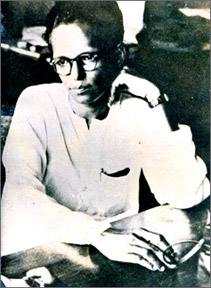
Egodahage George Wilfred Alwis Samarakoon known as Ananda Samarakoon was a Sri Lankan (Sinhalese) composer and musician. He composed the Sri Lankan national anthem "Namo Namo Matha" and is considered the father of artistic Sinhala music and founder of the modern Sri Lankan Sinhala Geeta Sahitya. He committed suicide in 1962.
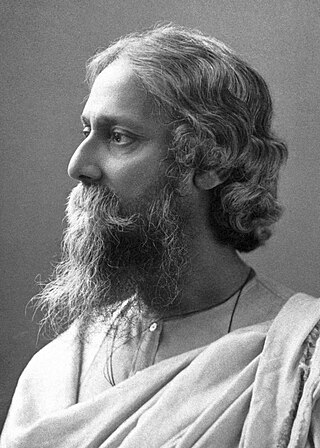
Bengali literature denotes the body of writings in the Bengali language and which covers Old Bengali, Middle- Bengali and Modern Bengali with the changes through the passage of time and dynastic patronization or non-patronization. Bengali has developed over the course of roughly 1,300 years. If the emergence of the Bengali literature supposes to date back to roughly 650 AD, the development of Bengali literature claims to be 1600 years old. The earliest extant work in Bengali literature is the Charyapada, a collection of Buddhist mystic songs in Old Bengali dating back to the 10th and 11th centuries. The timeline of Bengali literature is divided into three periods: ancient (650–1200), medieval (1200–1800) and modern. Medieval Bengali literature consists of various poetic genres, including Hindu religious scriptures, Islamic epics, Vaishnava texts, translations of Arabic, Persian and Sanskrit texts, and secular texts by Muslim poets. Novels were introduced in the mid-19th century. Nobel laureate Rabindranath Tagore is the best known figure of Bengali literature to the world. Kazi Nazrul Islam, notable for his activism and anti-British literature, was described as the Rebel Poet and is now recognised as the National poet of Bangladesh.

Rabindranath Tagore is a 1961 Indian documentary film written and directed by Satyajit Ray about the life and works of noted Bengali author Rabindranath Tagore. Ray started working on the documentary in early 1958. Shot in black-and-white, the finished film was released during the birth centenary year of Rabindranath Tagore, who was born on 7 May 1861. Ray avoided the controversial aspects of Tagore's life in order to make it as an official portrait of the poet. Though Tagore was known as a poet, Ray did not use any of Tagore's poetry as he was not happy with the English translation and believed that "it would not make the right impression if recited" and people would not consider Tagore "a very great poet," based on those translations. Satyajit Ray has been reported to have said about the documentary Rabindranath Tagore in his biography Satyajit Ray: The Inner Eye by W. Andrew Robinson that, "Ten or twelve minutes of it are among the most moving and powerful things that I have produced."
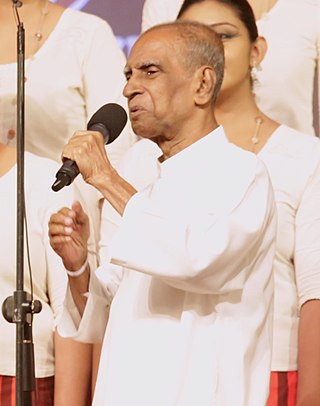
Sri Lankabhimanya Wannakuwattawaduge Don Albert Perera, better known by his adopted name Amaradeva, was a prominent Sri Lankan Sinhalese vocalist, violinist and composer. Primarily using traditional instruments like sitars, tablas and harmoniums, he incorporated Sinhala folk music with Indian ragas in his work. Many consider his contribution to the development of Sinhala music as unmatched; hence, he is occasionally cited as the "Maestro of Sri Lankan Music".
The Hela Havula is a Sinhalese literary organisation founded by Kumaratunga Munidasa in January 1941. 'Hela Hawula' was formed as the only organization in Sri Lanka to protect and uplift the Sinhala language, Sinhala land and Sinhala culture. 'Hela Hawula' has been recognized as a statutory body by the adoption of the Hela Hawula Establishment Act No. 38 in the Parliament of Sri Lanka Act No. 1992.
Jean Arasanayagam was a Sri Lankan poet and fiction writer. She wrote her books in English, and they have been translated into German, French, Danish, Swedish and Japanese.

Sunil Santha was a Sri Lankan composer, singer and lyricist. He was pivotal in the development of Sinhala music and folk songs in the mid to late 1940s and early 1950s. He composed the beloved soundtracks to Lester James Peries' films Rekava and Sandesaya in 1956 and 1960. In a later comeback, he produced several experimental works.

Swami Vipulananda, also known as Vipulananda Adigal, was a Sri Lankan Tamil Hindu social reformer, literary critic, author, poet, teacher and ascetic from the Eastern Province of Sri Lanka. Vipulananda was an early pioneer associated with the Indian-based Ramakrishna Mission in Sri Lanka. Along with other reformers, Vipulananda was instrumental in the revival of the Hindu religion and native traditions in Sri Lanka after a long period of dormancy and decline during the previous 500 years of colonial rule by various European powers.

Musaeus College is a Buddhist private girls' school in Colombo, Sri Lanka. The school is named after its founding principal, Marie Musaeus Higgins from Wismar, Germany, who served as the school's principal from 1891 to 1926. Musaeus College provides primary and secondary education to more than 6,500 girls from ages 3 to 18, and is managed by a board of trustees. The school's motto is "Follow the Light".
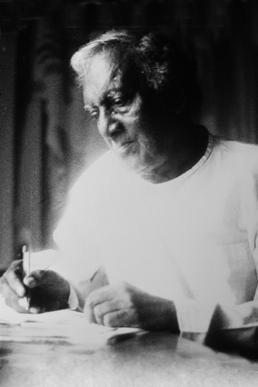
Danister Thomas Fernando is a pioneer Sri Lankan lyricist. Some of the pioneers, whose names most people could not even remember were honoured. The oldest lyricist, D. T. Fernando, was a forgotten name.

Venerable Sikkim Mahinda Thero, commonly known as S. Mahinda Thero, was a Buddhist monk from the state of Sikkim. He was a poet and author, and participated in the Sri Lankan independence movement. Although he was from Sikkim, he identified himself as a Tibetan, presumably because it was more well known in Ceylon.
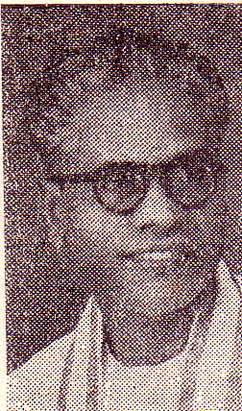
Kaarthigesar Ponnambalam Ratnam was a Sri Lankan Tamil academic, politician and Member of Parliament.

Muhandiram T. Sathasiva Iyer is a Ceylon Tamil scholar and a writer in Tamil language. He has translated many Sanskrit literature into Tamil.
Prof. Dona Amara Kasthuriarachchi, popularly as Amara Ranatunga, was a Sri Lankan singer and music director. One of the most honored singers of Sri Lanka, Amara is the first Professor of Music in Sri Lanka.
Nallathambi is a Tamil male given name. could refer to any of the following:













